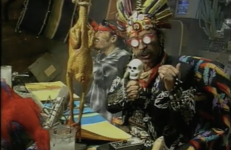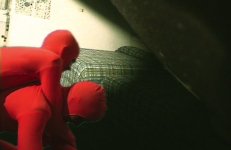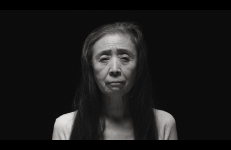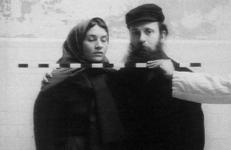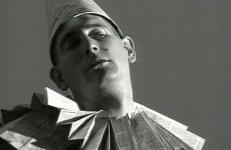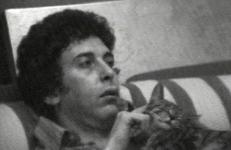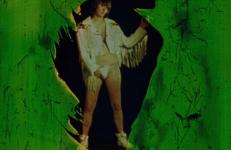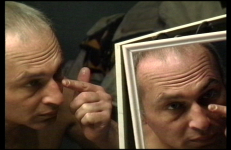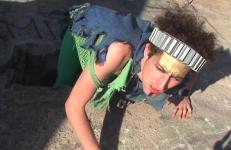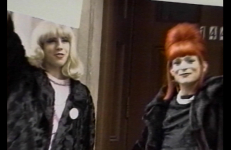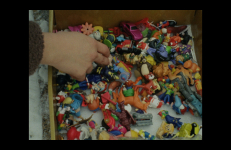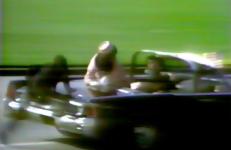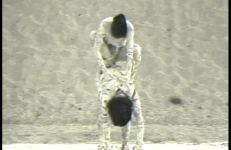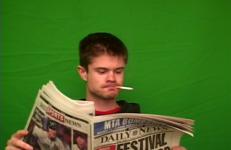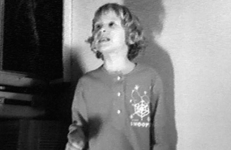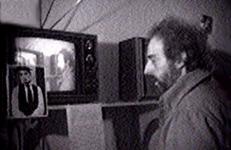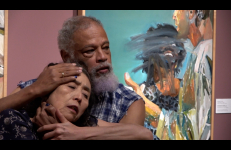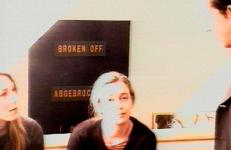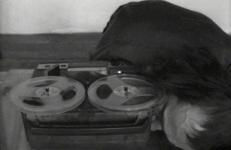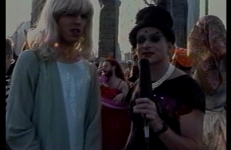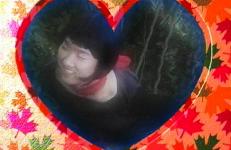Interrupting the nightly news in an act of guerrilla television, Gómez-Peña returns to the persona of a Chicano-Aztec veejay—"The Mexican who talks back, the illegal Mexican performance artist with state of the art technology"—to elaborate the complications of American identity. This post-NAFTA Cyber Aztec pirate commandeers the television signal from his underground "Vato bunker", where virtual reality meets Aztec ritual. Gómez-Peña embodies the doubly radical Chicano performance artist, delivering radical ideas through a radical form of entertainment.
Performance
Interrupting the nightly news in an act of guerrilla television, Gómez-Peña returns to the persona of a Chicano-Aztec veejay—"The Mexican who talks back, the illegal Mexican performance artist with state of the art technology"—to elaborate the complications of American identity. This post-NAFTA Cyber Aztec pirate commandeers the television signal from his underground "Vato bunker", where virtual reality meets Aztec ritual. Gómez-Peña embodies the doubly radical Chicano performance artist, delivering radical ideas through a radical form of entertainment.
Andro/lesbian body-doubles wrestle each other in an outer-space fantasy.
Performers: A.K. Burns & K8 Hardy
Audio: Matt Volla
This title is also available on A.K. Burns: Early Videoworks
John Killacky is Eiko's long time friend. It was in July 2018 when both of them were attending the tree planting ceremony of their mutual friend Sam Miller at the Jacob's Pillow that Eiko invited John to join her Duet Project. John proposed to create a video work that they both speak to their dead mothers.
After exchanging their writings, the video was shot and edited by Brian Stevenson in the studios of Vermont PBS on November 22, 2019.
Special thanks to Larry Connolly.
Between 1892 and 1927, almost 16 million people came to Ellis Island attempting to immigrate to the United States.
Between 1892 and 1927, almost 16 million people came to Ellis Island attempting to immigrate to the United States.
"The video Emission found its origin in three performances which I wrote between 1988 and 1991. In their original form, the performances dealt with sex, romance, and communication technologies. The video elaborates upon these themes to speak of how human beings exist in a margin between nature and technology, and works towards confounding any simplified analysis of this worn-out duality.
Benglis uses the video format as a metaphor for other types of limiting conditions or limited realities. "The constant motion of Benglis's hand-held camera (scanning her studio and two television sets) calls attention to the limits of the camera's field of vision: the walls of the studio are the ultimate 'enclosure' of the camera's eye. The open window and the sound of children (from the street) seem to suggest release; yet the confines of the studio are never truly broken."
Encounters I May Or May Not Have Had With Peter Berlin deals primarily with monumentality, narcissism and the ways in which our heroes are embedded into our identities, and manifested through the body. Through a variety of gestures, the pervasiveness of this practice is highlighted alongside its ultimate, inevitable failure. The viewer moves through various stages of anxiety, idolization and actual touchdown with 1970s gay sex icon Peter Berlin himself, capturing both the apparent and the hidden.
This video was made as the end-credit sequence for a film version of Ron Vawter's performance piece, Roy Cohen/Jack Smith, by Jill Godmilow. Ron was an extraordinary actor and extraordinary man. The two characters he portrays were gay men at radically opposite ends of the political, social, artistic and human spectrum.
Playwright and performance artist Marc Arthur paves a color-saturated path from 'awake consciousness' to sleeping 'dreamscape'.
Equal Rights for Unborn Drag Queens is a satirical short video in which Brenda and Glennda critique anti-abortion politics, homophobia, and religious fanaticism in the media. Interspersed between clips of right-wing news broadcasts is footage of Brenda having her nipple pierced, in an homage to Sandy Daley's Robert Having His Nipple Pierced (1971).
An episode of The Brenda and Glennda Show hosted by Brenda Sexual and Glennda Orgasm.
Esfir is a contemporary interpretation of an unrealized script entitled Women written by Soviet director Esfir Shub.
Irreverent yet poignant, The Eternal Frame is a re-enactment of the assassination of John F. Kennedy as seen in the famous Zapruder film. This home movie was immediately confiscated by the FBI, yet found its way into the visual subconscious of the nation. The Eternal Frame concentrates on this event as a crucial site of fascination and repression in the American mindset.
"The intent of this work was to examine and demystify the notion of the presidency, particularly Kennedy, as image archetype...."
— Doug Hall, 1984
Irreverent yet poignant, The Eternal Frame is a re-enactment of the assassination of John F. Kennedy as seen in the famous Zapruder film. This home movie was immediately confiscated by the FBI, yet found its way into the visual subconscious of the nation. The Eternal Frame concentrates on this event as a crucial site of fascination and repression in the American mindset.
"The intent of this work was to examine and demystify the notion of the presidency, particularly Kennedy, as image archetype...."
— Doug Hall, 1984
Irreverent yet poignant, The Eternal Frame is a re-enactment of the assassination of John F. Kennedy as seen in the famous Zapruder film. This home movie was immediately confiscated by the FBI, yet found its way into the visual subconscious of the nation. The Eternal Frame concentrates on this event as a crucial site of fascination and repression in the American mindset.
"The intent of this work was to examine and demystify the notion of the presidency, particularly Kennedy, as image archetype...."
— Doug Hall, 1984
Event Fission is an outdoor performance on the Hudson River landfill, produced by Creative Time. Eiko & Koma danced with a huge white flag billowing on top of a sand dune as the audience watched from below. The white flag was used to symbolically attack the newly developed downtown buildings. On a lower level of the landfill, to which Eiko & Koma tumbled down, there were fires on four corners of the performing area. At the end of the performance of 50 minutes, Eiko & Koma were swallowed into a deep hole they had dug and hid, disappearing with a blast of sand.
An audience-interactive game of Mad Libs, with support from a linguistically challenged newcomer. We replace various parts of speech in newspaper articles to create new, customized meanings.
Made from silent black and white tube camera footage of the artist taken by her father in the early 70s, this series of loops—through the examination of particular moments and gestures— is evocative for what it reveals and conceals about their relationship.
This title is also available on Helen Mirra Videoworks: Volume 1.
In 1972, Robert Morris and Lynda Benglis agreed to exchange videos in order to develop a dialogue between each other’s work. Morris’s video, Exchange, is a part of that process—a response to Benglis’s Mumble. At the beginning of the piece, Morris comments on the nature of the collaboration, their interaction, and what they represent to each other. Morris’s speculations about work, travel, and relationships are juxtaposed with frozen images of race cars, Benglis herself, images from Benglis's video, and Manet’s Olympia.
In collaboration with Ishmael Houston-Jones.
On September 1, 2022, Eiko and Ishmael Houston-Jones performed in Beverly McIver's painting exhibition Full Circle, curated by Kim Boganey.
The whole event took place in connected galleries of her show, but this excerpt is when Ishmael and Eiko danced a duet in front of the paintings that were also a duet of a sort.
Camera by Julie Ganas.
Edited by Eiko Otake.
There are times when concurrent multiple realities demand an attempt to determine who has this "place in the sun" and where, exactly, it is located. Hearts and Helicopters occurs at that moment in the lives of four people.
This title is also available on Lawrence Weiner: Hearts and Helicopters - A Trilogy.
Acconci listens to his own recorded monologue of sexually intimate secrets and repeatedly tries to obscure these secrets by shouting over the tape, demonstrating the paradoxical situation of the artist confounded by two desires: to reveal oneself for the sake of pleasing the audience, and the conflicting desire to protect one’s own ego. As viewers, we are intrigued and tantalized by the confession we never hear.
In Fagtasia Solstice, Brenda and Glennda attend a Radical Faerie event in New York City to commemorate the Summer Solstice. Through interviews with Faeries and footage of their walk across the Brooklyn Bridge, the group proposes to reclaim the city as a safe space for queer people, and discuss reorienting queer consciousness toward spirituality.
An episode of The Brenda and Glennda Show, hosted by Brenda Sexual and Glennda Orgasm. Featuring the Radical Faeries. Thanks to Julie Clark and Dana Nasrallah.
This sprawling drama about a group of country folk sucked into the fashion world of magazine layouts and romantic intrigue features a cast of glamorously garbed gals and good-natured bumpkins. Produced in collaboration with his students at the San Francisco Art Institute, the picture delivers high-octane antics fueled by the $800 budget and creative desperation typically inherent in these types of endeavors. The cast is large and labors valiantly with the high speed shooting schedule and color saturated subplots.




